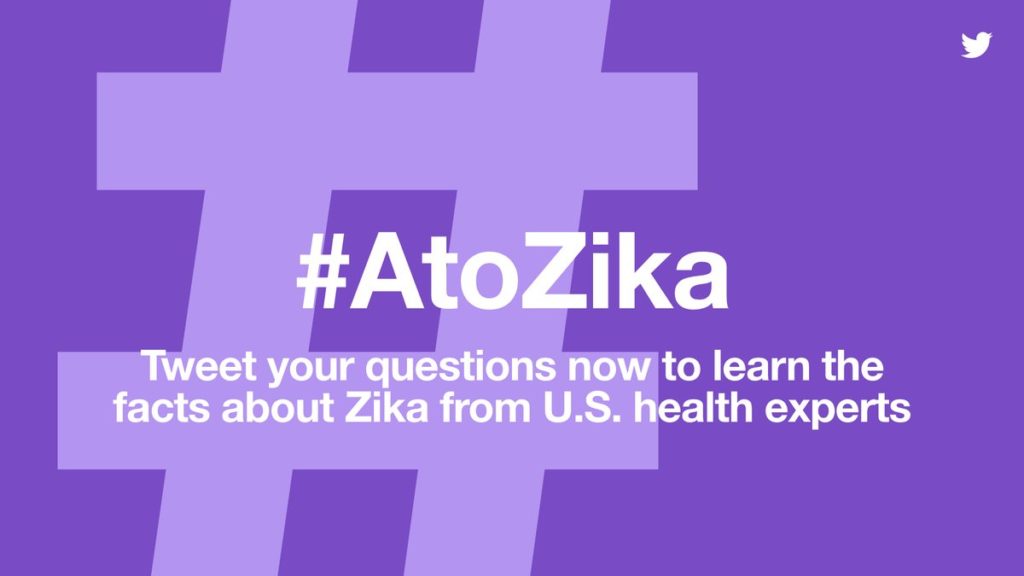Zika is one of the world’s most hot-button issues right now, and it may actually affect your travel plans. Cases of the virus have already been confirmed in South Florida, and a large portion of South and Latin America continue to battle with it. The Woman’s Group is committed to keeping our patients up-to-date on the latest information.
On August 30, Twitter and the U.S. Department of Health & Human Services hosted a Twitter chat on all things related to Zika. If you have a question about the virus, you can also drop them a note at #AtoZika on Twitter.
For the first time ever, the U.S. Department of Health & Human Services hosted an all-day Zika Twitter “Town Hall” where Twitter users could directly ask health professionals their questions about the virus and its repercussions. Experts included Center for Disease Control director Dr. Tom Frieden, the U.S. Office on Women’s Health and U.S. Secretary of Health Sylvia Burwell, and questions ranged from “what’s the best mosquito repellant?” (answer: anything with DEET) to “should women in South Florida postpone pregnancy?” (answer: not necessarily).
Here are excerpts from some of the tweets:
Question: What are the basic precautions for people in South Florida?
Dr. Anthony S. Fauci, NIAID Director: “When you go outside, wear clothes that cover most of the body and the exposed parts. Liberally use insect repellent; this is particularly true for pregnant women who must be protected.”
Question: How would you advise pregnant women who are traveling to Texas/Louisiana? (States with no local transmission, but next)
Dr. Tom Friedan, CDC Director: “Pregnant women who are anywhere where the Aedes aegypti mosquito is present should take steps to protect themselves against mosquito bites. That includes wearing long sleeves and long pants when possible, using insect repellent on exposed skin and reapplying as per the label instructions and staying indoors to the extent possible.”
Question: Are bug sprays safe for pregnant women to use?
Dr. Anthony S. Fauci, NIAID Director: “This is a very important question because often pregnant women are reluctant to use insect repellent. Insect repellent, including those that have DEET up to 30 percent, are safe for pregnant women throughout the pregnancy, and it is highly encouraged for women to use insect repellent during their pregnancy.”
Question: How come Zika has been relatively harmless for 70 years until now?
Dr. Tom Friedan, CDC Director: “We don’t know whether Zika has caused this problem for decades and it hasn’t been found, the virus has changed, or it didn’t spread widely. What we do know is Zika is causing terrible tragedies today in parts of Latin America and the Caribbean, and is going to continue to cause those until we do a better job preventing it.
Question: What are the obstacles that hinder controlling the spread of Zika?
Dr. Tom Friedan, CDC Director: “Three reasons: 1. The mosquito is hard to control—it’s the cockroach of mosquitoes. 2. People are out and about, and we are often bitten by mosquitoes. 3. We don’t have the resources we need to mount a robust fight against the disease.”
Question: When can we expect initial results of human clinical trials assessing safety of Zika vaccine candidate(s)?
Dr. Anthony S. Fauci, NIAID Director: “With regards to the first vaccine candidate, we’ll know about safety somewhere in November and December 2016. With regard to efficacy—whether it works or not—that may take anywhere from the beginning or middle of 2018 or even several years longer depending on the rate of infection in the community. The more infections, the quicker you get the answer.”
Question: Can you get Zika again and again or are you immune from further infections?
Dr. Anne Schuchat, Principal Deputy Director of CDC: “We think right now that once you’ve had a Zika infection, you’re protected for the long term, but it’s too soon for us to be certain about that.”
Question: At what point during a pregnancy can fetal effects of Zika be detected?
Dr. Anthony S. Fauci, NIAID Director: “The most vulnerable part of the pregnancy is the first trimester. A defect in the development of the brain of the baby can be detected right around 15-20 weeks.”
For more Q&As, check out the full conversation on Twitter at #AtoZika.
Full article at: http://www.cntraveler.com/travel-intel/health

